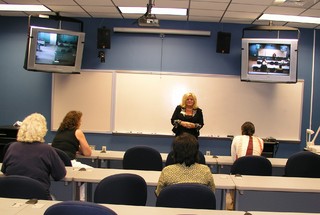VGCC Expands Online Learning Opportunities

In recent years, Vance-Granville Community College has experienced dramatic growth in the availability and popularity of classes that are offered online. In the spring 2006 semester, 1,270 students enrolled in online courses at VGCC.
“We are an Internet society,” said Evelyn Harris, Director of Distance Education at VGCC. “Learning in a classroom without walls is the wave of the future.” Harris manages the online offerings for credit in the college’s degree or diploma programs, collectively called “Learning at a Distance.” Five curriculum programs are fully available online, with more to come in time, Harris noted. In addition, many continuing education and literacy courses are offered online by VGCC. .
Harris explained that online courses, which are self-directed and convenient for students who work full-time or have children, ordinarily fill up quickly. Especially as gasoline prices have risen in recent years, the allure of learning from home has increased. An online “classroom” usually holds approximately 25-30 students, much like a classroom in which students sit face-to-face with their instructors. Courses are designed to be equal in difficulty to their face-to-face counterparts, neither easier nor more taxing, Harris noted..
“If Vance-Granville didn’t offer online courses, I wouldn’t be able to graduate in August 2006,” said one student in an anonymous survey earlier this year. “I am able to study and do my homework at my own pace. Being a stay-at-home mom, I’m able to do my work from home at any time of the day or night. I wish I could have had all of my classes online.” The survey respondent added that she planned to pursue a Bachelor’s degree online after graduating from VGCC. Another online student cited “better use of time, flexibility, lack of disruptions, less pressure, and ability to concentrate and retain more” as some advantages of taking courses at home. Gas prices were on the mind of a third student, who remarked, “Considering that I live 25-30 miles away from the college, it really helps me out, living on a part-time income.”.
The concept of distance education dates back to correspondence courses by mail in the nineteenth century. More recently, telecourses (courses by television) enjoyed a brief success before waning in popularity about ten years ago. In the late 1990s, online learning first appeared. At VGCC, online courses began with only a handful of courses and grew in number slowly until recently. Online learning is now changing from simple, text-based instruction to a style that adds more audio-visual and interactive features, which Harris thinks students will find more appealing. .
From spring 2003 to spring 2006, the number of courses offered online by VGCC more than doubled, from 29 to 68. This fall, that number has reached close to 100, including courses ranging from Art Appreciation to Introduction to Criminal Justice. More courses are currently in the testing stage. Harris is working to produce as many online courses as possible, but she strives for quality as much as quantity..
“Every curriculum has some element that could be done online,” she said. “Even if a pharmacy student can only take two or three or his or her classes online, that can be a tremendous savings for the student.”.
A recent emphasis in the field of online learning is making all courses accessible to students with disabilities. Although Harris said that improving accessibility is a “huge task” mandated by the federal government, she welcomes it and feels that it will also benefit instructors and students who are not handicapped. Part of Harris’s job is coordinating professional development courses in which VGCC instructors learn about issues like accessibility and audio-visual elements in distance education..
“Who knows what the future will bring?” Harris asked. “We are constantly looking at changes, trying to stay one step ahead.” She said that VGCC strives to give itself and its four-county service area a competitive edge through its efforts in areas such as online learning. “We are limited only by the availability of high-speed Internet in the area,” she noted..
Another VGCC distance-learning initiative is “V-Net,” a video system that allows classes to be transmitted from one of the college’s campuses to another. Three of the four campuses are part of this network, with the fourth set to come online in spring 2007. “If a student is not comfortable with doing a course completely online,” Harris explained, “then they can go to a campus close to them and not have to drive very far.”.
More and more high school and home-school students are taking advantage of online VGCC courses through the dual-enrollment program. “The benefit is that the students get high school and college credit, and tuition is waived, so they will only have to pay for books,” Harris said. She added that a wide variety of dual-enrollment courses are offered online, from English and web design to math and geology..
Evelyn Harris not only directs VGCC’s online learning programs; she also calls herself a “true believer” in distance education who practices what she preaches. Harris has completed graduate studies at East Carolina University and at the University of North Carolina-Chapel Hill, all online. .
Persons interested in a Distance Education Curriculum course for college credit should contact Evelyn Harris by calling (252) 492-2061, ext. 3254. .
Pictured above: VGCC Business Technologies Dean Jo Anna Jones teaches a class in the V-Net classroom on the college’s Main Campus, while television screens above her show (left) a similar classroom at another campus and (right) the classroom in which she is currently standing.

